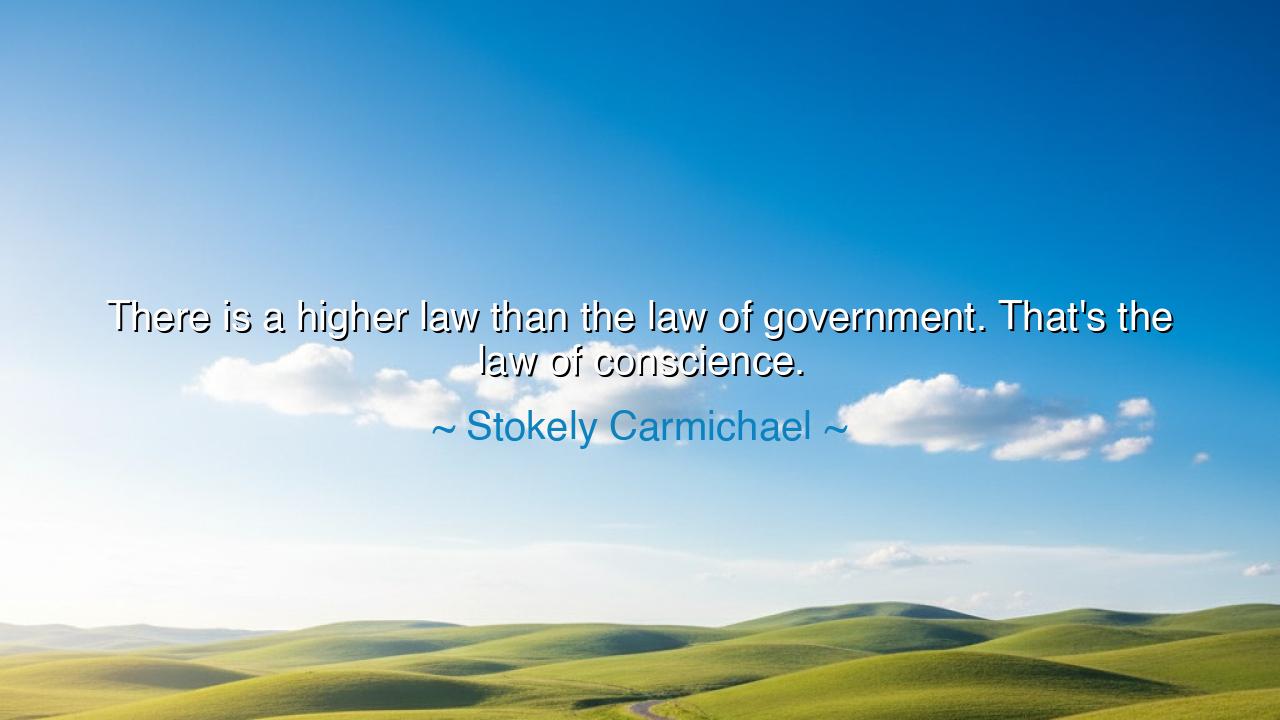
There is a higher law than the law of government. That's the law






"There is a higher law than the law of government. That's the law of conscience." Thus spoke Stokely Carmichael, the fiery voice of a generation that refused to bow to injustice, the revolutionary mind who reminded a weary people that righteousness does not come from authority, but from within the soul. His words were not meant to comfort, but to awaken — to remind humanity that conscience, the quiet voice of truth within the heart, stands above the decrees of kings and the statutes of men. For when government becomes an instrument of oppression, when its laws protect cruelty rather than justice, then obedience becomes sin, and disobedience becomes duty.
Carmichael spoke in the crucible of the Civil Rights Movement, a time when the air of America trembled with both hope and anguish. He had seen his people beaten, imprisoned, and murdered for seeking the simple dignity of equality. He had witnessed laws — written by men who claimed to serve justice — used to maintain segregation, to deny humanity. And so he proclaimed, with the fire of a prophet, that there exists a higher law, one not inscribed in parchment or passed in chambers, but written in the soul of every human being. This was the law of conscience — the eternal command to stand for what is right, even when the world demands silence.
The meaning of his words runs deeper than rebellion; it is a meditation on the nature of justice itself. Government, by its nature, governs through power — it commands, it punishes, it compels. But conscience governs through truth. It is the whisper of the divine within man, reminding him that legality and morality are not the same. Many things have been legal — slavery, segregation, censorship — and yet have stood as crimes against humanity. Many things have been illegal — resistance, protest, liberation — and yet have been the purest acts of righteousness. Thus, Carmichael’s declaration is a challenge to every age: when the laws of men defy the laws of conscience, which shall you obey?
History is heavy with examples of those who chose conscience over command. Consider Rosa Parks, who, in quiet defiance, refused to surrender her seat on a segregated bus. The law condemned her act; conscience exalted it. Or Dr. Martin Luther King Jr., who from the cell in Birmingham wrote that “an unjust law is no law at all,” echoing the same truth that Carmichael now thundered — that the moral responsibility of the citizen is not blind obedience, but moral resistance. And beyond America, one recalls Mahatma Gandhi, who defied the British Empire not with violence, but with a conscience so strong that no empire could conquer it. In their courage, we see the living embodiment of Carmichael’s higher law.
Yet Carmichael’s words hold a more piercing warning as well. For it is not only governments that can stray from justice — it is men and women themselves, when they surrender conscience for comfort, truth for conformity. The law of conscience is not an easy law; it demands sacrifice. It calls us to stand against the tide, to speak truth when it is dangerous, to act with integrity even when it costs us everything. The weak look to government for permission; the strong look within and act by principle. “Only the conscience,” Carmichael teaches, “can make a man free.” For when a person’s sense of right is captive to external authority, he ceases to be a citizen and becomes a subject.
The power of Carmichael’s insight lies in its universality. Whether under a democracy or a dictatorship, every society faces moments when its laws betray its ideals. In those moments, the salvation of the nation rests not with rulers, but with those whose consciences refuse to bend. It was conscience that led abolitionists to defy the Fugitive Slave Act, that moved suffragettes to demand the right to vote, that inspired whistleblowers to expose corruption and truth-tellers to speak when silence was safer. Conscience is the light that governments may dim but never extinguish, the flame that burns in every soul that remembers what it means to be truly human.
The lesson of Carmichael’s wisdom is this: power may command, but it cannot sanctify. The voice of conscience must forever stand as the guardian of freedom and the measure of law. Do not yield your moral compass to authority; test every command against the truth of your heart. Stand firm when the crowd bows low, and remember that no government, however mighty, can dictate the contents of your soul. Conscience is the truest form of sovereignty, and the only law that endures when empires fall and statutes fade.
So remember the words of Stokely Carmichael — that there is, and always will be, a higher law than the law of government. It is the law that bids us see the humanity in others, that forbids us to become tools of injustice, that demands we rise when power seeks to crush the weak. Let this law guide your actions, even when the path is perilous. For only those who live by conscience can ever claim to live freely — and only those who defend that sacred law can keep the light of liberty alive for generations to come.






AAdministratorAdministrator
Welcome, honored guests. Please leave a comment, we will respond soon